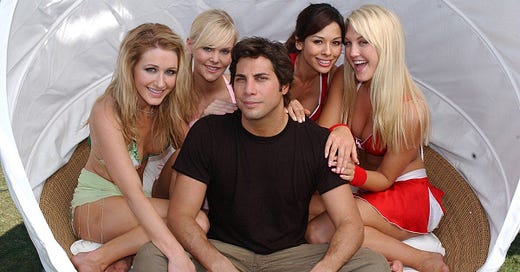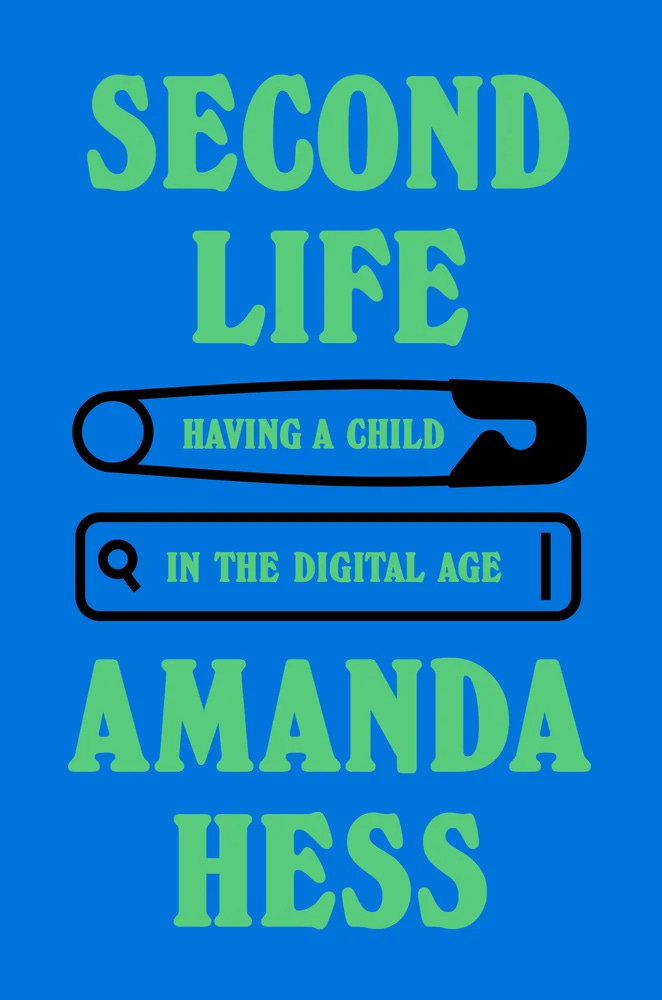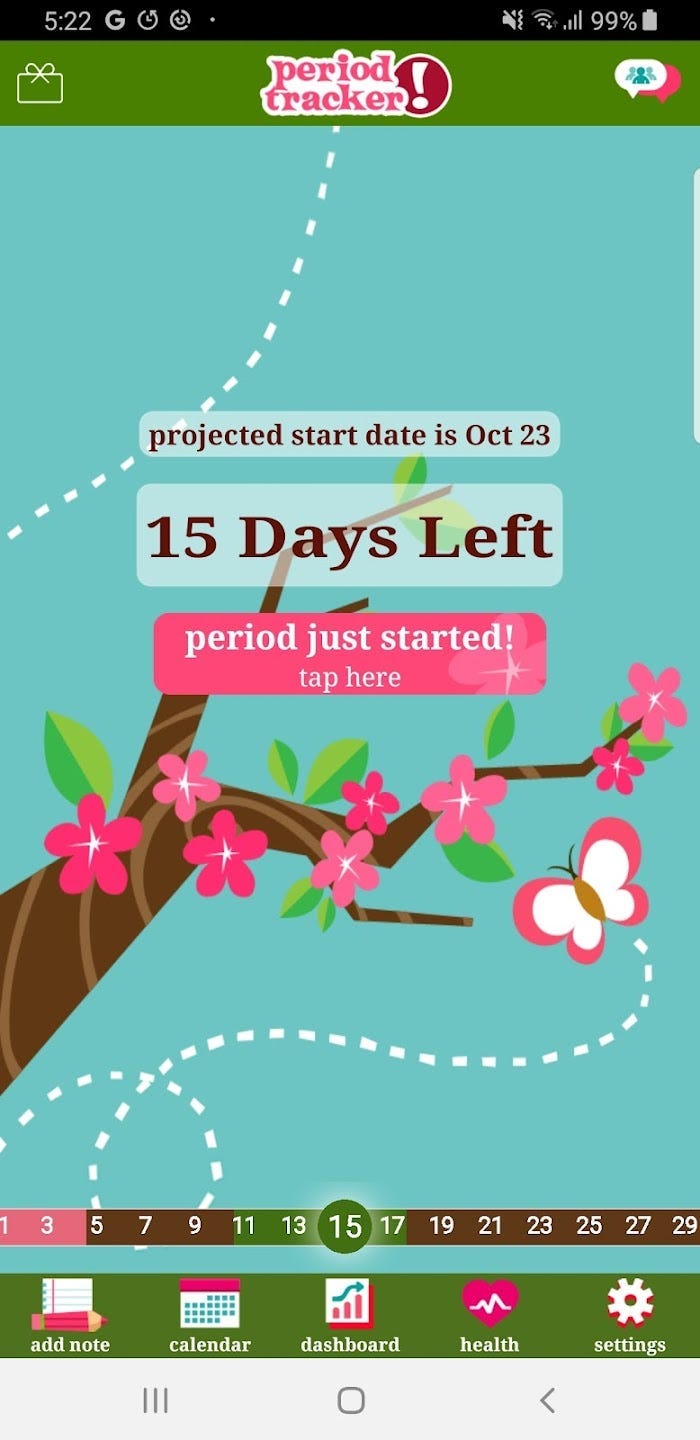The Girls Gone Wild to pregnancy app pipeline
Millennial women's unique self-discipline— and our desire to redeem ourselves through motherhood— goes beyond "internalized misogyny."
In her new book Second Life: Having a Child in the Digital Age, Amanda Hess writes about how technology has infiltrated our psyches. With the rise of so-called “femtech,” women’s minds and bodies have been particularly colonized by apps, message boards, and social media feeds that program women for constant self-surveillance. Self-discipline now comes in every flavor, every genre, every device, every platform, and usually to no more complicated ends than to line, as Hess notes, the pockets of men.
Hess’s account of the subjectivity of the millennial woman on the verge of parenthood is thrillingly precise and poetic. It’s one of the best books “about motherhood” I’ve read in recent years. She begins with a deep phenomenology of what it was like to engage with one’s period app, day after day, while trying to get pregnant, before we were all so wary of the government tracking us through period apps.
Hess personifies her chosen interface, Flo, who became the digital BFF who helped Hess become a mama. Flo tracked her cycle and ovulation days and recorded the unprotected sex Hess had while trying to get pregnant. Eventually, Hess unlocked “pregnancy mode”— the highest level in the app.
Fertility apps not only gamify ovulation and pregnancy for millennial women. They teach women to see their bodies as games. For many millennial women like myself, this has meant tapping into a routine of self-monitoring and self-punishment that was likely already there, forged both in the freedom women sought in the 90s via male-authored images of sexuality like Girls Gone Wild, and in the subsequent public floggings of some of our favorite sexy icons, as those women grew up.
Hess’s writing on Flo stirred memories of my own maternal journey, which began when I was a girl, taught that motherhood was the ultimate feminine becoming— but really kicked off when I downloaded a period app for the same reasons Hess downloaded hers. I wanted to get pregnant, I didn’t really have anyone to talk to about that journey, and I wanted that desire to live alongside me, in my phone.
My app was called, simply, the Period Tracker, and she became for me a living, breathing representation of my own fertility— a crudely animated floral promise that I could optimize and control the experience of getting pregnant, and, just maybe, motherhood itself. She offered me a path to redemption.
Lately, we’ve come to rely quite heavily on the term “internalized misogyny” to describe how patriarchal culture turns women against themselves, and on each other, leading us to carry water for male power by disciplining ourselves and other women in arenas of diet, beauty, health, sexuality, public discourse, you name it.
I’m reading Sophie Gilbert’s Girl and Girl, in which Gilbert claims that the age in which I came up, as a cis, outwardly straight woman, was an era in which women like me were taught to hate themselves. My socialization as a girl certainly included a heavy education in self-hatred. But as I grew up, the culture seemed to offer me a way out: I could transform that self-hatred into empowerment, the kind that came with becoming a mother. I could be good again.
Many millennial women who had once envied MTV spring breaks and AOL chat rooms heard the same message. We made friends online, or friends with apps and online programs. IMs transformed into digital avatars, apps, community forums, comments sections, influencers, social feeds, Facebook groups, and Reddit threads. They become our new friends, lovers, confidantes, portals into affiliation and attachment, both real and definitely not IRL. Most of us had few skills by which to measure how this was all fucking us up.
Either way, the digital world provided solace from a world that kept breaking its economic and social promises. For women of a certain age— that is, older millennials like me— self-hatred became part of our constitution young, but so did the redemption arc. If we optimized ourselves just right, found the right MLM community or branded motherhood affinity group, maybe we could come back from the turmoil of our youth.
When I ovulated, the tree of life in my Period Tracker bloomed. I pulled up images of the Period Tracker on Google while writing this essay, straining to remember my experience. Though I carried her in my pocket and in my work bag for well over a year, even before I began “trying” for a child, I could hardly remember her name, or what I thought I was using her for back then.
The Period Tracker images stored online, however, promptly flooded me with a kind of sense memory— evidence that although this was just an app, my time spent with my Period Tracker was a kind of core memory for my own maternal becoming.
Flo, Hess writes, became “an accountant of the flesh,” as so many of our self-monitoring apps do. But the apps were also flesh themselves— and they reshaped our flesh, too.
My Period Tracker was not only a way to determine when I should have sex if I wanted to get pregnant, it was my first real exposure to reproductive information about myself, a kind of portal into my own insides. And, more frankly, it was a way of testing whether or not I had spoiled myself with all the hedonism and addiction and badness that characterized my 20s.
Hess writes extensively, too, about how she blamed herself when her child developed a rare genetic condition in pregnancy. Her observations about maternal self-blame are both specific to her life, and also take on a kind of universal, timeless quality. After all, women have been blaming themselves for the bad outcomes of pregnancy, childbirth, and motherhood for as long as we have had been reproducing.
But there’s a uniquely digitized element of this self-blame that Hess lights up. Pregnancy apps became paths to self-improvement, virtual worlds where girls became mothers, communities through which we could make good on our femininity by finding our true mama power (or confess clandestinely to other women about how we failed). After all the booze and drugs and hookup culture and premarital sex and performing for male desire, the digital world of pregnancy and motherhood promised, for so many women, a pathway to making the female body great again.
When I did get pregnant, I then became obsessive about the foods I ate. I can recall stalking around Costco during a holiday grocery run with my sister, desperately hungry for a free sample table, reading the labels on everything in the store, finding nothing unadulterated. I was starving, but I could not fathom putting preservatives and food dyes inside me while pregnant— as though they would color my baby green for all to see.
“It’s better to eat something than nothing,” my sister said, and her words slapped me, hanging in my head for days. I realized I was no longer sure I believed her.
Years after I gave birth, I stumbled online on a term that explained what I experienced during my first pregnancy and in the years I breastfed. Orthorexia is defined as an obsession with healthy foods, which means depends on one ingesting a range of moral beliefs about food. Many of those beliefs came from the multiple apps I was using while pregnant, to track how my baby grew inside me.
Had I really suffered from an eating disorder though? Or had I simply followed the cultural demand to obsess about my baby’s health, and my role in it, to its most logical end? Was there really any difference?
My food choices in pregnancy became an outward expression of my good mothering, and of my larger moral qualifications for the job. It was not just that I didn’t want to get fat— that was there, sure, surrounded as I was by a culture that warned of gaining too much baby weight (so, you know, I could redeem myself but also return to my OG status as sexual object asap). But more than that, I was trying to avoid bungling the basic baby cocktail, turning out a child with a low IQ or, I don’t know, diabetes.
And I didn’t know. Hess documents with clarity the lack of clarity many millennial women had about their pregnancies, and childbirths, as our adult sexual education was reduced, in app, to comparing the size of our “baby” to a fruit or French pastry, and to slick mama vernacular that both presumed our fetal cells were already babies, and presumed we were not and never could be adult humans. We were little girls who needed repeated, condescending lectures about avoiding deli meat and sushi.
Years later, during my second labor and delivery, I had to be hooked up to a steady stream of antibiotics because I had tested positive for Group B strep in my vagina. I worried my baby would have a faulty microbiome forever. Maybe my baby was affected by that hospital policy; maybe not. I scoured the web for information about the risks of delivering without the antibiotics, but I could find no information that was not part of some natural/medical birth debate, and it didn’t really matter anyway, since denying the drugs meant the hospital would call CPS on me before my second baby was even born. And I had to be good. I went to the hospital the moment my water broke, and they hooked me up to the IV.
Given the way the maternal redemption arc hit so many millennial women, it’s no wonder we are still floundering in discourses of maternal purity. Natural birthing, anti-vax, natural parenting, attachment parenting, anti-birth-control MAHA stuff, all are ideologies that provide a kind of aspirational regression into purity, a false freedom.
For a generation raised on the idea that being a bad girl was hot, but also very very bad, the allure of an app— or a politics— that makes us good again, is hard to deny. But as a friend reminded me recently, all purity politics are politics of white supremacy, because the idea that one can be pure relies on the premise that others are unclean.
There’s something here about our desires to be free from technology and the internet, too, neither of which, obviously, has made us happier or freer. But these digital worlds live inside us now, for better or for worse. No one is pure. The task now is to make meaning— and connection— out of the pull into these false worlds, without submitting to the doomed hope of purchasing our own absolution.







Reading this makes me wonder...why not just say 'no' to these apps? If women who came of age in the 90s/2000s were made to feel pigeonholed by 'Girls Gone Wild', what led them to download a bevy of apps to track their every movement and every bodily function, which is another kind of pigeonholing? Was it peer pressure? Or is it possibly class-related? Some combination of the two? I'm going to sound like an old lady here (I'm in my mid-50s), but the way I tracked my period in my 20s and 30s was using a paper calendar. No advertiser was able to track me and sell other products/apps to me, and I feel lucky for that. (Of course, when I was in my 20s smartphones weren't around yet.) When I got pregnant at 32, I did sign up on one of those sites that sent a weekly email about the stages of fetus development, which was fun and fascinating for me until I started getting a barrage of other emails trying to sell me high-end baby gear and supplements. I came to the conclusion that the weekly email wasn't telling me anything I couldn't find in the two or three pregnancy books I'd bought, so I unsubcribed. The spammy ads kept coming, so I gave up and ditched that email address for another, but that worked...I was free!
For my cohort, it was the Porky's franchise & the John Hughes movies that tried to pigeonhole what a young woman should "be" and left a lot of us uncomfortable and wary. It seems like every era's popular culture does this. So the question becomes, what do you do with those feelings? How do we (individually/collectively) call bullshit on the bullshit? It seems like a good start for this particular era is to opt out of the apps and reclaim what privacy we have left. Sure, an app is more convenient than a paper calendar, but what is the longterm cost? Could it be that the cult of convenience is a trap? I liken it to AI being pushed into everything--the human cost (AI trained on an author's work without permission or compensation; jobs being eliminated or devalued by AI) and environmental (each AI search wastes 16 ounces of water)--why are we just supposed to "accept" that this is the way things are? Because the tech overlords say so? Fuck that noise.